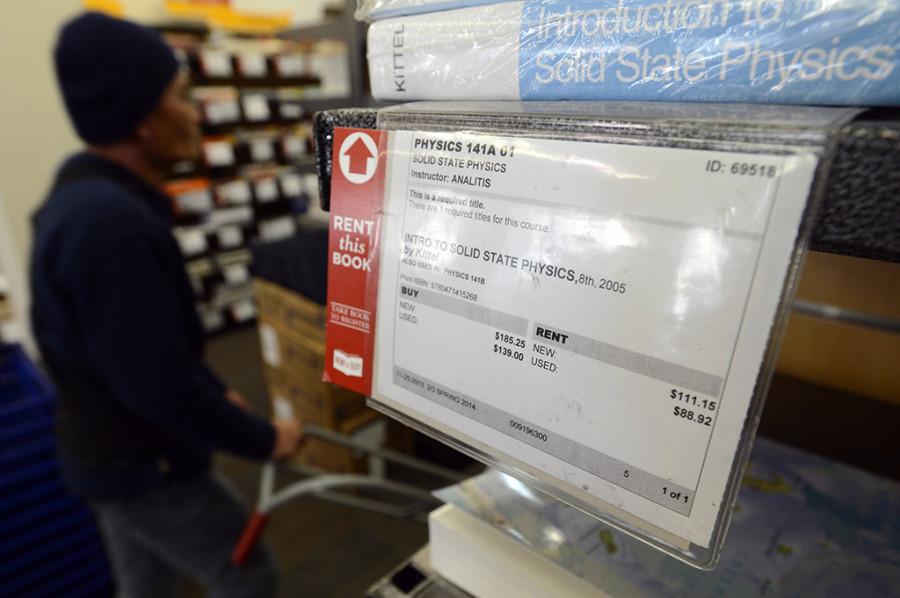MCT NEWSFEATURES
By Katy Murphy
OAKLAND, Calif. — Despite new technologies and a 2012 California law promising college students relief from soaring textbook costs, students’ bookstore spending is higher than ever — now about $1,200 for books and supplies.
And a new survey shows that students are responding with a cost-cutting measure that could seriously hurt their grades: They’re leaving the costly textbooks on the shelf. Two-thirds of college students surveyed said that they hadn’t bought a required textbook at least once because it was too expensive, according to a national report released Monday by the Student Public Interest Research Groups, a coalition of statewide student organizations.
“I had to borrow from friends sometimes,” said Caroline O’Callahan, a University of California, Berkeley, junior from Redwood City who didn’t buy a biology textbook last semester that cost about $120. “It was tricky because I was relying on lectures and notes of my own.”
Some professors use open-source materials for their courses, but others select books that are regularly updated, making used copies hard to come by. College bookstores commonly offer rentals, but those prices can be steep: It costs $88.92 to rent a used physics textbook from the UC Berkeley campus bookstore and $185 to buy it new.
Between 2002 and 2012, textbook prices shot up 82 percent, nearly three times the rate of inflation, in part because of quizzes and other online applications often included, according to the federal Government Accountability Office.
Two California laws meant to ease the pain have languished unfunded for nearly a year. The pair of open-access textbook laws by state Sen. President Pro Tem Darrell Steinberg — Senate Bills 1052 and 1053 — promised to help by making available faculty-approved online textbooks for 50 popular college courses, starting this academic year. But the project got off to a late start because of a funding delay, and students will have to wait at least until next January for the first books to hit the open-access library managed by the California State University system.
A faculty council charged with finding or developing free materials for UC, CSU and community college courses — and then urging professors to assign them — was to hold its first meeting this week.
“One of the goals of this project is to get the word out to people that there are good materials available,” said Bill Jacob, chairman of the UC system’s Academic Senate.
Jacob said he has used open-source textbooks for years in his math classes at UC Santa Barbara — often assigning a collection of out-of-print books posted online with the authors’ consent. But that approach takes time.
“You have to go out and find them,” he said.
As more colleges create open-access digital libraries — and develop new, open-source textbooks — that task should become easier, he said.
San Jose State’s library runs a campaign to encourage the faculty to use free or low-cost texts. SJSU students spend an average of $750 per year on books, and 70 percent reported not buying a textbook because of the cost, according to the campus.
The program saved 3,289 students about $90,883 — $28 each, on average — in the spring of 2013, SJSU estimates.
A larger initiative at Rice University in Texas — OpenStax College — reported last spring it had saved 40,000 students $3.7 million, and that 300 institutions had signed up for its free, peer-reviewed materials for the 2013-14 year.
A Statistics I textbook, which typically costs $90 used and $150 new, would be free for the 120,000 California students who take the course each semester if their professors used the OpenStax version available now, said Dean Florez, president and CEO of the 20 Million Minds Foundation, which has underwritten some of the new OpenStax courses.
Jacob said California faculty will review the OpenStax textbooks, and others. Florez said he hopes faculty leaders approve them ahead of schedule — by early April, when professors adopt their books for the fall term.
Professors have good reason to bring about change; they see the consequences of textbook-skimping, said Beth Smith, chairwoman of California’s Intersegmental Committee of Academic Senates, which is involved in the state’s open-access initiative.
“I think if you speak to any faculty member, they will tell you that students, for a variety of reasons, can’t or don’t purchase the traditional textbooks,” Smith said. “It has a devastating effect on their ability to keep up with the course.”
———
©2014 The Oakland Tribune (Oakland, Calif.)
Visit The Oakland Tribune (Oakland, Calif.) at www.insidebayarea.com
Distributed by MCT Information Services
—————
PHOTOS (from MCT Photo Service, 202-383-6099): TEXTBOOKS



